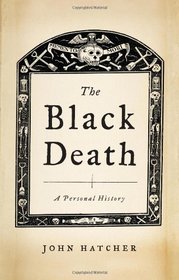I've read innumerable books about the Black Death, from just about every perspective and angle imaginable, but I always enjoy those which bring a much-needed personal and intimate view to this tragic area of study. Some scholars have difficulty with this type of history, as, admittedly, a fair amount of it is conjecture, but it imparts a much-needed dimension, and is far more accessible to a more general audience than more academic works with which many people are less familiar and comfortable. It takes the form of a chronological account of the epidemic, which moved across the continent in a slow, unstoppable wave. Some of the most poignant scenes are the accounts of the people/characters who realize that a looming catastrophe is coming, but are seemingly powerless to do anything about it, or to protect themselves or their loved ones. Rather, they stoically await their fate as death closes in on their small village from all sides, like a flood, rendering escape impossible.
This book is a very good introduction to this vital event in world history. Some more in-depth knowledge of the topic would enhance it even more for readers, as there is a minimal amount of background information regarding the plague elsewhere than in England, but that's really the whole point of this work: to focus on one particular area and to provide an in-depth look at how it affected persons spanning the entirety of the social scale, from the wealthiest landowners (who weren't all that wealthy, comparatively, in this case), to the most destitute and landless, whose daily existence was a struggle for survival. When one reads other accounts of the wake of the plague, it becomes more clear and profound just how devastating this event was, and how it shaped the world in which we now live, despite occurring nearly seven centuries ago. This is what many would refer to as "micro" history, rather than macrohistory, of which there are plenty regarding this topic. It's not a novel or historical fiction, which the author eschewed in favor of a more traditional historical narrative, which I think many readers were expecting, but it provides a good balance between illustrating the various characters and the effect this event had on their lives, and providing a fairly thorough account of this specific period in world history.
This book is a very good introduction to this vital event in world history. Some more in-depth knowledge of the topic would enhance it even more for readers, as there is a minimal amount of background information regarding the plague elsewhere than in England, but that's really the whole point of this work: to focus on one particular area and to provide an in-depth look at how it affected persons spanning the entirety of the social scale, from the wealthiest landowners (who weren't all that wealthy, comparatively, in this case), to the most destitute and landless, whose daily existence was a struggle for survival. When one reads other accounts of the wake of the plague, it becomes more clear and profound just how devastating this event was, and how it shaped the world in which we now live, despite occurring nearly seven centuries ago. This is what many would refer to as "micro" history, rather than macrohistory, of which there are plenty regarding this topic. It's not a novel or historical fiction, which the author eschewed in favor of a more traditional historical narrative, which I think many readers were expecting, but it provides a good balance between illustrating the various characters and the effect this event had on their lives, and providing a fairly thorough account of this specific period in world history.
Professor Hatcher is too much of an academic for this book to really seem novelized. However, he is very thorough and detailed about Medieval (14th century) life. Other than his rather long, convoluted sentence structure, it is not a hard read. I'm glad I read it.




